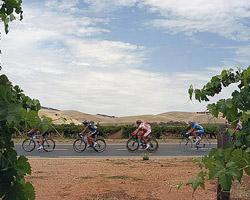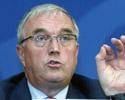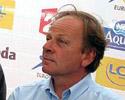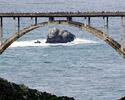News feature: September 22, 2007
Reinventing the ProTour: the calm after the storm?
2008 will see a major change in professional cycling, now that a significant number of races will no longer be part of the ProTour. The Tour de France, the Giro d'Italia and the Vuelta a España will be missing from the top-ranked series, and it would seem that other hallowed events such as Paris-Roubaix, Paris-Nice, Tirreno-Adriatico and the Tour of Lombardy will also be on a separate calendar. Cyclingnews' Shane Stokes spoke to Pat McQuaid about these developments, and discovered that despite the upheaval, the UCI President still remains positive about the future of the series.

|
This week's announcement that the UCI have accepted the Grand Tour organisers' insistence that they will not be part of the ProTour means a return to uncertainty for many of the big teams. Holding a ProTour licence was seen as a guarantee for them to take part in those major events. Unibet.com was an obvious exception, the team appearing to be excluded by the Grand Tour organisers this year due in part to the ProTour standoff with the UCI, but others benefited by having a licence.
Since the series was introduced in 2005, teams have been paying big money to be part of it. With their guaranteed participation in the major races now no longer assured, it is very possible that some of those squads may be questioning the value of their investment. Yet, rather than being downbeat about the turn of events, UCI President Pat McQuaid has told Cyclingnews there is still plenty of benefit for teams to have a ProTour licence. And, he says, these pluses will become even more clear as time passes.
"If cycling just remains within the four countries of Western Europe, which is what the Grand Tours want us to do, the sport will never develop."-McQuaid is looking to take the ProTour overseas, most likely to the US and Australia. |
"There will be certainly an incentive for the teams in the ProTour," he insisted this week. "The system will be one which will be designed and developed to assist the teams and to assist the organisers in growing, in moving forward. That is what it was initially meant to do, to find other sources of funding for the teams and the organisers alike, and also for economies of scale in terms of TV production.
"There are a lot of factors in there, all of which will help them and to benefit the sport. The teams are keen that that should happen."
Up until recently, it was hoped that a compromise would be found and that things could continue as initially planned. However the UCI ProTour Council will next week discuss the restructuring of the series, determining the new direction that it will now go in. According to McQuaid, it is likely that the ProTour will travel outside Europe for the first time next season, and that this will be the start of a bigger global focus in the future.
McQuaid was asked by Cyclingnews if he envisaged a major overseas event being part of the series in 2008. "It is quite possible," he answered. "That is something that the ProTour Council will consider next week."

|
It has long been rumoured that events such as the Tour Down Under and the Tour of California are being considered for ProTour status. The organisers of both races have spoken of their willingness to go in this direction, and while McQuaid did not give an indication if one (or both) of these are in the running for next year's promotion to the top rank, most will assume that these are the most likely candidates for early upgrading.
Other events which have been previously floated as possible contenders for future ProTour slots are the Tour of Qinghai Lake in China and the Tour de Langkawi in Malaysia. The latter event has faced some financial uncertainties in recent years and so it is likely that it would only be considered if and when the necessary guarantees were in place.
While the loss of races such as the Tour de France and the Giro d'Italia will undeniably take the lustre off the ProTour in the short term, McQuaid was sounding surprisingly upbeat about the future, saying that globalisation of the sport could only be good for its long-term development.
"If cycling just remains within the four countries of Western Europe, which is what the Grand Tours want us to do, the sport will never develop," he said. "All we will be doing is continuing to look after the financial interests of ASO. They are the only company in cycling making large sums of money.
"Because of the expense of producing bike races now and the fact that more and more organisers are now being asked to pay for TV production, we have to find new sources of revenue. Through the ProTour there are possibilities to do that, and we will work with the teams and the organisers who wish to be involved in order to develop that."
Going forward without the Grand Tour organisers

|
ASO, RCS Sport and Unipublic have long been in opposition to the ProTour. They, the UCI and the IPCT met on March 5 of this year and agreed to try to sort out their differences but, with relations strained since the Tour de France, any prospect of a satisfactory deal has since been lost. McQuaid and the UCI have accepted that the Tour, the Giro d'Italia and the Vuelta a España will form no part of the ProTour. But what about the other races organised by the three Grand Tours, such as Paris-Nice - are they also definitely out?
"Well, it is up to them, really," he answered, referring to the organisers. "If they wish for us to include one or two of their events in the ProTour then we would certainly consider it. However the indications that they have given would suggest this is not the case. I sat down with Patrice Clerc in Lyon in February of this year and he said to me, 'look, Pat, you can do what you want with the ProTour, you can go to America, you can go to Australia, go where you want, but we don't want to be part of it.'
"During the Tour de France he reiterated that on several occasions and then likewise, on the fifth of September, he sent me a letter stating quite clearly that they don't want to be in the ProTour in 2008 or indeed ever. So ultimately, rather than being at war with them the whole time and forcing them into a ProTour that they don't want to be in, we are going to propose to the management committee of the UCI and the Professional Cycling Council next week that we accept their viewpoint, accept their demands, and put them onto a separate calendar.
"We will then work to develop a ProTour with teams and with organisers who want to be part of the ProTour concept."
"He is worried alright...he is worried about his own shareholders' money."-McQuaid says that ASO president Patrice Clerc thinks the ProTour will affect his company's revenue streams. |
ASO have now got what they wished - namely a green light not to be involved - but Patrice Clerc has said that he is still not happy. "They [the new proposals] are extremely worrying as regards the future of cycling," he told AFP earlier this week.
McQuaid asserts that the real reason Clerc is displeased is because he realises that in time, the ProTour could expand and grow and take cycling in a new direction. "I am sure that is what it is," he told Cyclingnews. "He is worried alright...he is worried about his own shareholders' money. The money they earn every year just goes directly to the shareholders, it doesn't go into the sport of cycling.
"He realises that there is a potential to develop cycling around the world, and he thinks that that development will affect his revenues. And, with the view and the attitude that he has taken, it will affect his revenues."
"Our attitude was that they would come with us and as the cake gets bigger, that they would also benefit from it. But they have taken a completely different attitude. We cannot continue to fight with them, so let's agree with them on a calendar that we put them on, agree the participation rules with them and the teams as well, and let us get on with it."
New direction

|
When the ProTour was first developed, one of the key aims was to promote the sport in such a way as to facilitate its development and ability to compete with other competing sports such as soccer and Formula One. The idea was to have the best teams in the best races, enabling sponsors and fans to know exactly what they were getting. While those with the relevant licences will continue to have a green light to ProTour races, it is now not guaranteed that those teams will ride the events held by the Grand Tour organisers. However the UCI's belief is that the quality of these squads should still be enough to ensure their participation.
"The teams clearly have a focus on getting into the Tour as well," said McQuaid. "But at the end of the day, the ProTour teams are going to be those at the highest level. In addition, the Tour de France is talking about ethics now being the number one priority to get into the race. Well, the ProTour teams are going to be the teams with the highest ethics and with the highest standards and the highest surveillance and the highest administration and the highest profile. So therefore I can't see the Tour de France not wanting those teams in the race."
A total of 11 races within the ProTour are promoted by the Grand Tour organisers. The lateness of the decision plus the complex issues behind holding such races means that replacements for all those events will take time. This will have an impact in 2008, even if one or more races will be held outside Europe.
"Next year there will be a reduced size calendar because these decisions are only being taken at the moment and we obviously have to plan long enough ahead," says McQuaid. " There will be some events which won't be ready to go on the ProTour next year, but they will certainly be ready by 2009.
"And, with regards to 2009, don't forget that the concept of an Australian ProTour team and a British one has been discussed. These are things which will add to the mix as well, adding to the interest and the value. An Australian ProTour team, a British ProTour team, an American ProTour team and a Russian ProTour team - this is what we need to do to internationalise the sport and to develop it."
He is clear what the sponsors will themselves need. "It is not that we are giving them guarantees that they will ride the Tour de France, but we are certainly going to give guarantees to our sponsors that they will ride the ProTour events. We will have a ProTour which will be of interest to sponsors, and especially sponsors who have any sort of a global reach or a global desire. We are going to develop a ProTour which is of major importance around the world, and that will itself help the development of the sport."
Cyclingnews' recent coverage of the ProTour-Grand Tours split
October 4, 2008 - New ASO chief to maintain values
September 26, 2008 - UCI declares peace, appoints new VP
August 30, 2008 - UCI re-signs five ProTour races
August 22, 2008 - ProTour: Bouncing back or lame duck?
August 19, 2008 - Stapleton analyses 'world calendar'
August 18, 2008 - Feedback on 'world calendar'
August 18, 2008 - UCI announces 'world calendar'
Cyclingnews' complete coverage of the ProTour-Grand Tours split

